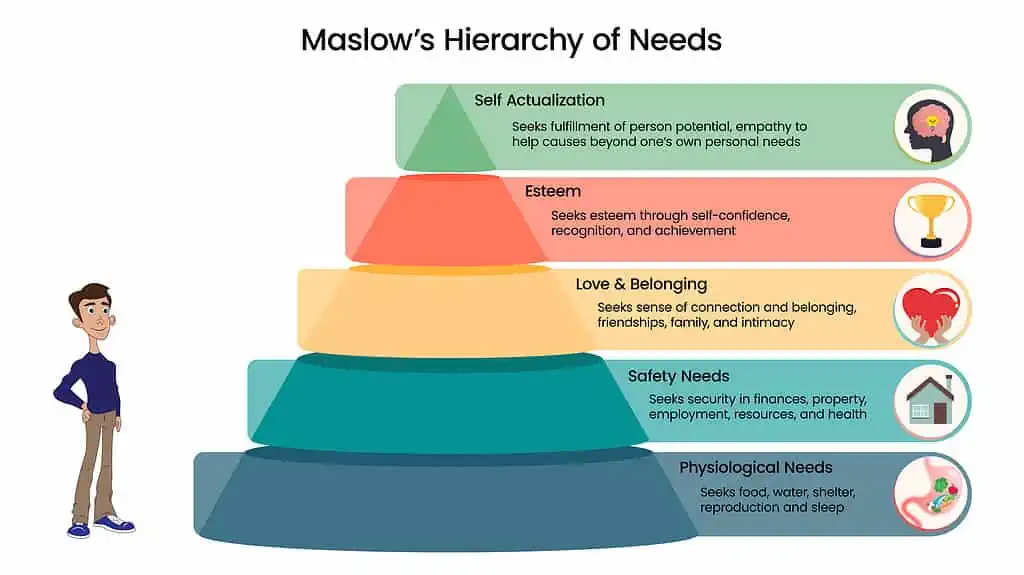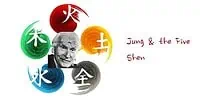Chinese Medicine and Maslow’s Hierarchy of Needs are two distinct frameworks that offer insights into human behaviour, motivation, and well-being. Although they originate from different cultural and philosophical backgrounds, they share some common ground in their understanding of human needs and the pursuit of balance and harmony. In this article, we will examine the relationship between the Five Shen of Chinese Medicine and Maslow’s Hierarchy of Needs, highlighting the potential for an integrated approach to personal growth and well-being.
The Five Shen (五神, Wǔshén) in Chinese Medicine symbolize five aspects of an individual’s spiritual essence or consciousness, each connected to one of the five primary organ systems: the Heart (Shen), the Liver (Hun), the Spleen (Yi), the Lungs (Po), and the Kidneys (Zhi). The Five Shen are believed to impact a person’s emotional and mental well-being, with their balance being essential for overall health and the pursuit of self-actualization.
Heart (Shen): The Mind and Emotional Stability
The Shen embodies the cognitive and emotional dimensions of a person’s consciousness. It governs mental processes such as thought, memory, and awareness, as well as emotional regulation. A balanced Shen allows a person to possess a clear and focused mind and maintain emotional stability, fostering the development of self-esteem and a sense of belonging.
Liver (Hun): The Ethereal Soul and Self-Transcendence
The Hun, as the aspect of the soul responsible for spiritual awareness, intuition, and the ability to access wisdom from one’s ancestors or higher consciousness, contributes to the attainment of self-transcendence. Associated with dreams, inspiration, and creativity, a balanced Hun enables a person to connect with their spiritual nature and access profound wisdom, encouraging personal growth and the realization of their full potential.
Spleen (Yi): The Intellect and Cognitive Needs
The Yi, associated with rational thinking, analysis, and problem-solving, is crucial for fulfilling one’s cognitive needs. In a balanced state, the Yi enables a person to think clearly, make sound decisions, and maintain focus on their goals, promoting the pursuit of knowledge and understanding.
Lungs (Po): The Corporeal Soul and Physiological Needs
The Po, representing the physical aspects of a person’s consciousness and governing the body’s instincts and reflexes, is essential for meeting physiological needs. Closely tied to the breath and responsible for the regulation of the body’s vital energies, a balanced Po allows a person to maintain a strong connection between their body and mind, ensuring physical health and vitality.
Kidneys (Zhi): The Willpower and Self-Actualization
The Zhi, relating to a person’s willpower, drive, and determination, plays a vital role in the pursuit of self-actualization. Responsible for the ability to persevere, endure hardships, and overcome obstacles, a balanced Zhi enables a person to stay motivated and focused on their purpose, even in the face of adversity, allowing them to realize their unique potential and achieve their highest aspirations.
In the spirit of Maslow’s humanistic psychology, the Five Shen can be understood as contributing to the fulfilment of the hierarchy of needs, from physiological and safety needs to self-actualization and self-transcendence. By nurturing the balance of these aspects of the human spirit, individuals can foster their emotional and mental well-being, promoting a holistic approach to personal growth and the pursuit of self-actualization.
Maslow’s Hierarchy of Needs

Abraham Maslow’s Hierarchy of Needs is a psychological theory that categorizes human needs into a hierarchical structure, starting with basic physiological needs and moving up to self-actualization. The hierarchy comprises five levels:
- Physiological Needs: Basic biological requirements for survival, such as food, water, shelter, and sleep.
- Safety Needs: The need for a secure and stable environment, free from threats and danger.
- Love and Belonging Needs: The need for social connections, affection, and a sense of belonging to a group or community.
- Esteem Needs: The need for self-respect, recognition, and a sense of accomplishment and mastery.
- Self-Actualization: The pursuit of personal growth, self-discovery, and the realization of one’s full potential.
Mapping the Five Shen with Maslow’s Hierarchy of Needs
Lungs (Po) and Physiological Needs
The Lungs, with their connection to the physical body and vital energies, correspond to the most basic level of Maslow’s hierarchy, the physiological needs. The Po represents the foundation of well-being, ensuring that the body’s instincts and reflexes function properly. In a balanced state, the Po allows a person to meet their basic needs for survival and maintain physical health.
Kidneys (Zhi) and Safety Needs
The Kidneys, representing willpower and determination, align with the safety needs in Maslow’s hierarchy. A balanced Zhi enables a person to persevere and overcome obstacles, creating a stable and secure environment for themselves and their loved ones. The Zhi’s ability to adapt and endure hardships ensures a sense of safety and security.
Spleen (Yi) and Love and Belonging Needs
The Spleen’s association with the intellect and rational thinking corresponds with the love and belonging needs in Maslow’s hierarchy. A balanced Yi allows a person to engage in effective communication, problem-solving, and decision-making, which are essential for building and maintaining healthy relationships and social connections. The Yi’s capacity for clear thinking fosters a sense of belonging and emotional support within a community.
Heart (Shen) and Esteem Needs
The Heart’s role in emotional regulation and mental processes mirrors the esteem needs in Maslow’s hierarchy. A balanced Shen enables a person to maintain emotional stability and self-awareness, contributing to a strong sense of self-respect and accomplishment. The Shen’s ability to regulate emotions and maintain mental clarity promotes self-confidence and recognition from others.
Liver (Hun) and Self-Actualization
The Liver, representing the ethereal soul and spiritual awareness, aligns with the highest level of Maslow’s hierarchy, self-actualization. A balanced Hun allows a person to access their inner wisdom, intuition, and creativity, fostering personal growth and self-discovery. The Hun’s connection to the divine and higher consciousness supports the pursuit of one’s full potential and the realization of their unique purpose.
Conclusion
The connection between the Five Shen of Chinese Medicine and Maslow’s Hierarchy of Needs highlights the potential for a holistic, integrated approach to personal growth and well-being. By understanding the interplay between these two frameworks, individuals and practitioners can address various aspects of human needs and consciousness, promoting overall health and balance.
The Five Shen and Maslow’s Hierarchy of Needs complement one another, offering a comprehensive perspective on human motivation, behaviour, and well-being. By appreciating the interconnectedness of this ancient wisdom and modern psychological theories, we can deepen our understanding of the human psyche and facilitate healing and growth in a diverse and interconnected world.






